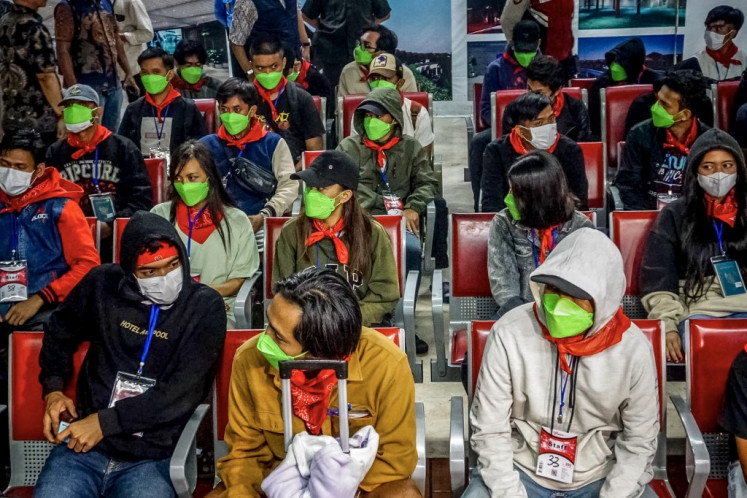Popular Reads
Top Results
Can't find what you're looking for?
View all search resultsPopular Reads
Top Results
Can't find what you're looking for?
View all search resultsFood for the gods
Healthier: Women prepare miniature portions of rujak (fruit salad) for the gods
Change text size
Gift Premium Articles
to Anyone
Healthier: Women prepare miniature portions of rujak (fruit salad) for the gods.
Escher-like steps wind up, down and around the Samuan Tiga series of Hindu temples, the 11th century birth site of Balinese Hinduism in Gianyar.
This week, thousands of local people are climbing these steps and making offerings to the gods in the bi-annual Pedudusan Alit ceremony. This is a middle level ceremony, says 48 year-old Made Budiarta, who along with 400 friends is working in the temple's more earthly zone, its dirt floored kitchens, smoky with wood fires and the roar of gas heated woks full of boiling oil.
Food is so often at the heart of ceremonies around the globe. In the West it is turkey and ham for Christmas, in China it is New Year jiazi (dumpling) and tea eggs as families come together to share the bounty. Here in Bali, the gods also have their share of ceremonial delicacies prepared by worshippers known as Parakan.
This is an organization of men from the temple responsible for the planning and execution of the regular ceremonies. One of their most important roles is as chefs for the gods preparing duck, pork, chicken and vegetables as offerings. Piles of spent coconut shells litter the floors as men chop mountains of long beans and grate coconut meat for urab salad, mince pork for satay, prepare suckling pigs for roasting and butcher the dozens of ducks quacking in their nearby pen.
At 78 years of age, head chef for this ritual bake off, Ketut Jedrum, has been cooking at Samuan Tiga temple for more than 60 years using knowledge handed down from generation to generation.
'We pray before we start to prepare the food for the gods. When we cook the pig we pray first because this food is a symbolic meal for the gods, it's holy food so it is spiritually cleansed before cooking,' says the lean and wizened Pak Ketut. He adds that the gods do not have a particular favorite food as the meals are symbolic offerings only, however the most holy of these is the duck says 50 year old Made, who has been helping prepare food for the gods since 1993.
Culinary art: Delicate snacks for the gods are made by local women.
'We see the duck as the most holy of these foods because the duck can live in two worlds. Ducks can live in the mud and forage for food there and also live on the dry land, and they can fly as well,' says Made, adding he is excited and happy to be working with friends to prepare these sacred offerings.
'Eating at the temple, the food is more delicious. Maybe because before we eat the food it has passed by the gods as an offering to them,' says another chef at Samuan Tiga, Sudarmo who explains that after the food have been offered to the gods they are shared among temple volunteers, priests, dancers and musicians.
While the men of the 11 banjars (traditional neighborhood organization) belonging to Samuan Tiga temple are hard at work over their cooking fires, nearby hundreds of middle aged women dressed in black sarongs and white kebaya are turning out thousands of tiny snacks for the gods, such as miniature portions of rujak salad and japitan (crunchy deep fried rice flour).
The women gather for over a month to prepare these offerings, explains 63 year old Putu Bandung. 'We work for a month to prepare all the offerings while the men cook. The work load is the same, because we have lots of different types of banten [offerings] to prepare,' says Putu.
Despite her 70 years, Premas Gunung, who works over a wood fired wok of boiling oil frying the japitan, says she never tires of her time at the temple preparing offerings for her gods.
'I've been coming here since I was a little girl. It's like being with family. There are more than 200 of us women from 11 different banjars and we all know each other and enjoy working together. This does not make me tired,' says the still tall and striking Premas.
For these hundreds of Hindus, coming together to prepare foods as offerings to the gods is also a celebration of community says 55-year-old Jero Sari. 'I like doing this, sharing this work, because it relaxes me having this time with friends,' For the shy Sudarmo in the men's kitchens, temple life means even more than friendship and a sense of belonging. 'If I don't come to temple my mind is not clear. I come to help with the food and ceremonial preparations, and my belief is that if I don't help I will feel confused, but when I help at the temple I feel calm and happy,' says Sudarmo, who counts his community as family.
Togetherness: Many hands make a light workload.
Signature menu: Roast pork offerings for gods and men.
Special choice: Ketut Jedrum, 78, with the ducks that will be offered to the gods.
For the gods: Men fry food that will be offered to the gods before they are enjoyed by the men.
' Photos by JP/J.B.Djwan















